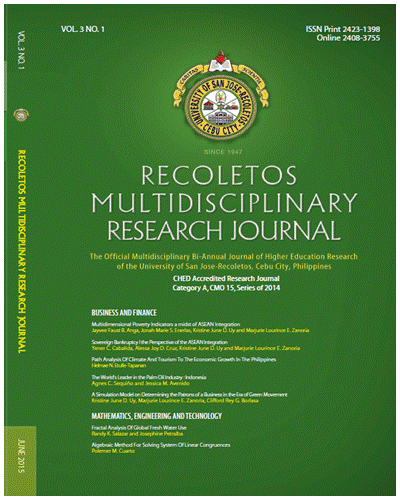The World’s Leader in the Palm Oil Industry : Indonesia
DOI:
https://doi.org/10.32871/rmrj1503.01.04Keywords:
palm oil, crude palm oil, environmental scanningAbstract
Indonesia, being the world leader in the production of crude palm oil, has been successful in serving the domestic and world market with palm products and palm derivatives. The industry contributes US$17.6 billion through exports in 2012. At present, the demand for crude palm oil has soared high due to the increasing awareness of the varied uses of palm oil. The challenge to countries cultivating oil palm is how to cope with the local and global demand .The focus now is to increase plantation areas to produce a higher volume of crude oil to serve the needs of the world market. Today, the total land area planted to oil palm in Indonesia has reached 9.7 million hectares. This study used data mining and Delphi technique. Data were sourced from public domain websites and several databases. This study determined the gap between production and utilization and to provide information to existing industry players ,policy makers, future investors, and would-be entrants to the industry on the latest trends noting the fast development of the industry not only in Indonesia but also in other Southeast Asian countries. Although Indonesia has been successful in providing the local and international market with palm oil products and palm derivatives, it has to benchmark with other palm producing countries to avoid industry stagnation and to intensify diversification particularly in the development of new edible products to take advantage of the health benefits derived from the use of palm oil.
References
Barlow C., Zahari, Z., & Gondowarsito, R. (2003). The Indonesian palm oil industry. Oil Palm Industry Economic Journal, 3(1), 8-15.
Basiron, Y. (2008). Malaysia’s oil palm: Hallmark of sustainable development. Global Oils & Fats Business Magazine, 5(4).
Butler, R. A. (2013). Indonesian palm oil industry would support land swaps to protect forest,
while expanding production. Retrieved from http://news.mongabay.com/2013/04/indonesian-palm-oil-industry-would-support-land-swaps-to-protect-forest-while-expanding-production/
Indonesian Palm Oil Development to Accomplish the Indonesian Vision on the Year 2020. (2003). Oil Palm Industry Economic Journal, 3(1).
Kui, D. P. C. F. (2008). Malaysian efforts in developing responsible practices in the palm oil industry. Global Oils & Fats Business Magazine, 5(4).
Lama, M. K., Tan, K. T., & Lee, K. T. (2009). Malaysian palm oil: Surviving the food versus fuel dispute for a sustainable future. Renewable and Sustainable Energy Reviews, 13(6-7), 1456–1464.
The oil palm tree. (2012). Retrieved from http://www.mpoc.org.my/The_Oil_Palm_Tree.aspx
Suranovic, S. M. (2010). International trade: Theory and policy. Irvington, N.Y: Flat World Knowledge, Inc.
USDA. (2007, December 31), Indonesia: Palm Oil Production Prospects Continue to Grow. United States Department of Agriculture Foreign Agricultural Service Commodity Intelligence Report.
Villanueva, J. (2011). Oil palm expansion in the Philippines analysis of land rights, environment
and food security issues. In M. Colchester & S. Chao (Eds.), Oil Palm Expansion in South East Asia: Trends and implications for local communities and indigenous peoples (pp. 110-216). England : Forest Peoples Programme.
Voegele, E. (2011, July 20). European Commission announces new voluntary schemes under Renewable Energy Directive. Biodeisel Magazine.
Downloads
Published
How to Cite
Issue
Section
License
Copyright of the Journal belongs to the University of San Jose-Recoletos


